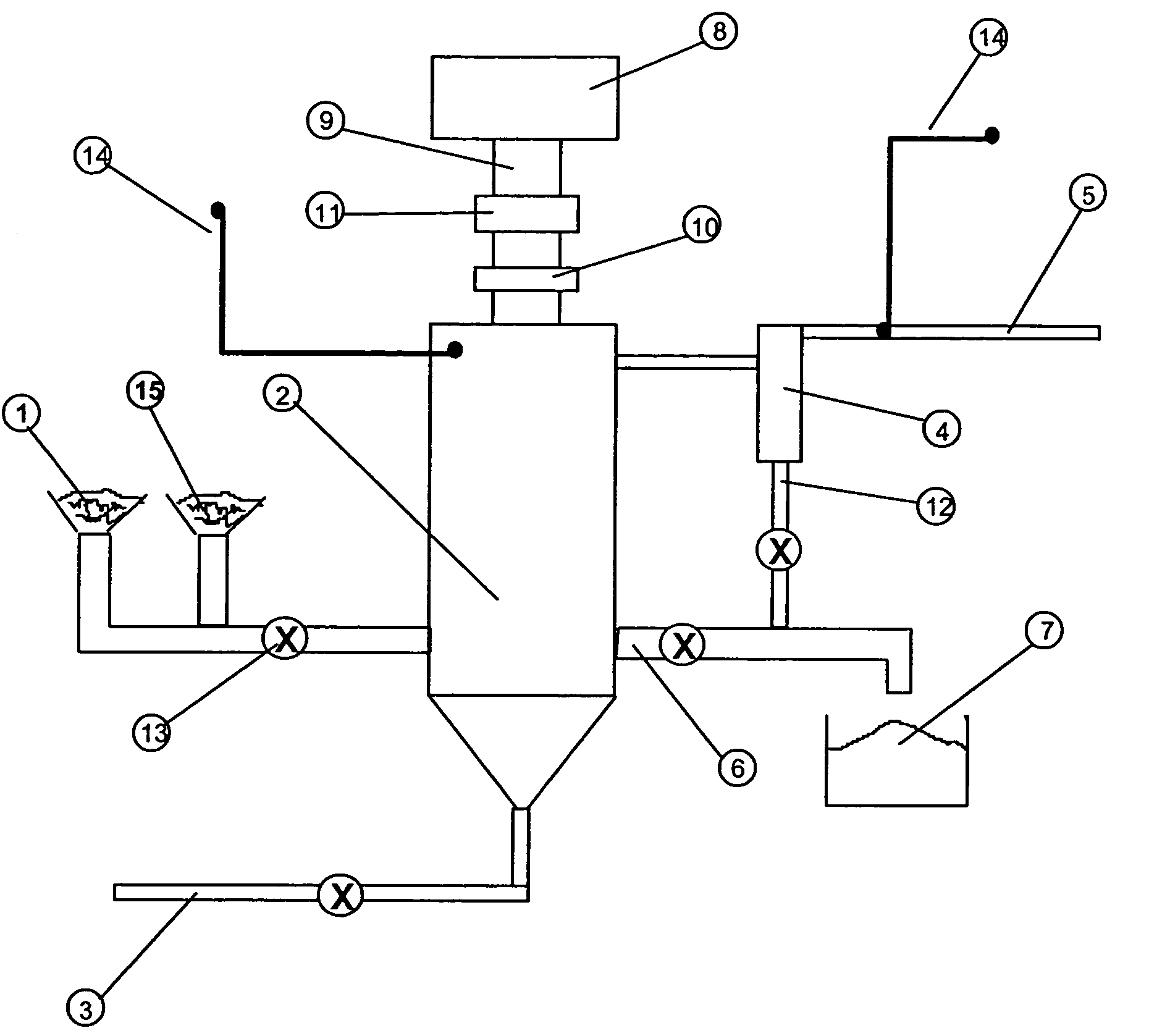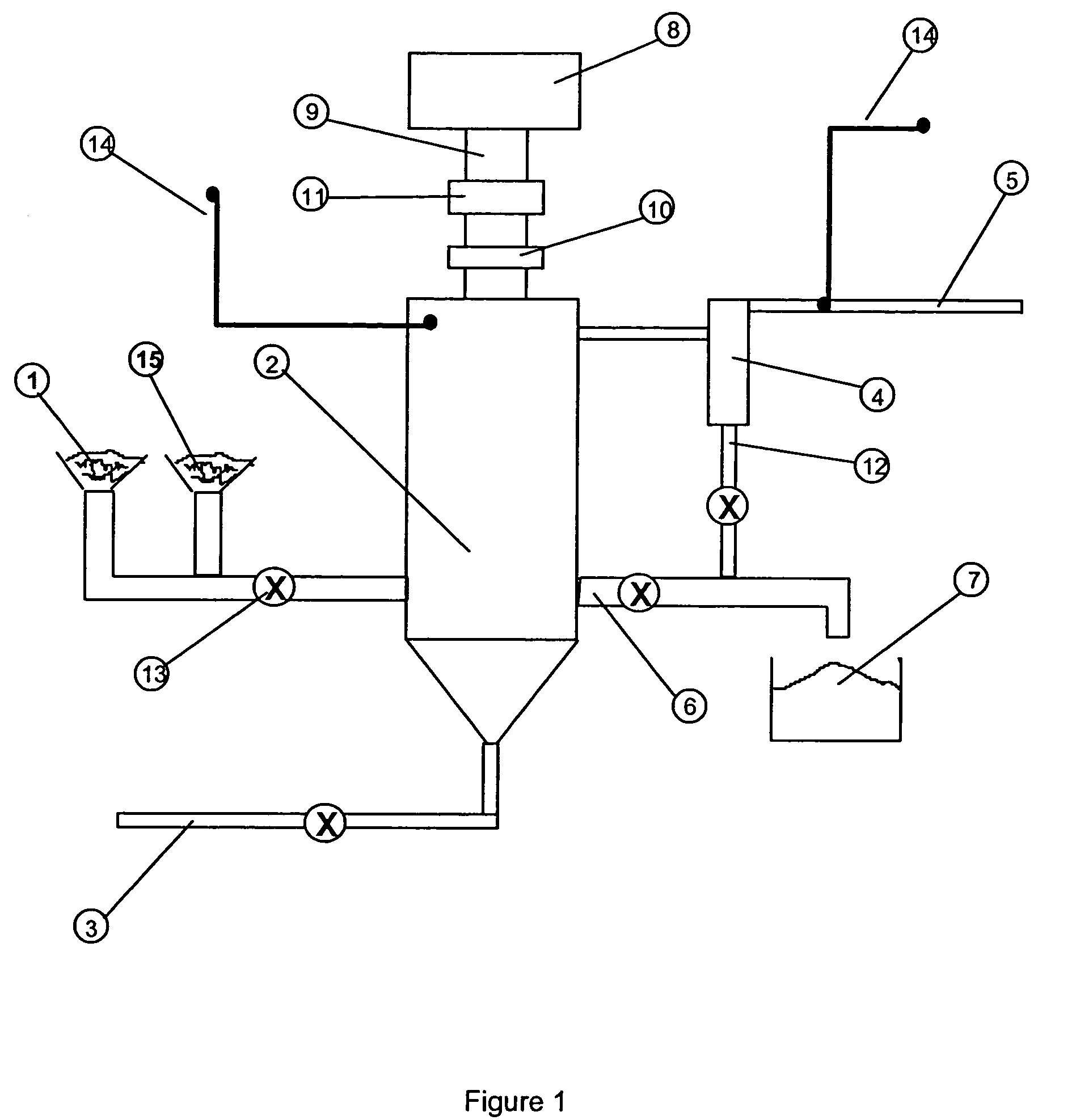Method of removing mercury from mercury contaminated materials
a technology of mercury contaminated materials and scrubbing, which is applied in the direction of mercury compounds, electric/magnetic/electromagnetic heating, furnaces, etc., can solve the problems that scrubbing mercury has become a necessary (albeit expensive) componen
- Summary
- Abstract
- Description
- Claims
- Application Information
AI Technical Summary
Benefits of technology
Problems solved by technology
Method used
Image
Examples
example 1
[0044]The apparatus as schematically represented in FIG. 1 was set up to process a quantity of coal combustion fly ash which was known to contain mercury. A microwave frequency of 915 MHz was used. The fluidizing gas was ambient air.
[0045]The feedstock fly ash was processed at a temperature of approximately 820° C. Throughout the test period of approximately 400 minutes duration, the material was passed through the reactor vessel at a rate of approximately 6 lbs per minute.
[0046]The mercury content of the feedstock was measured to be 79 parts per billion (ppb). The unburned carbon content, characterized as the LOI (Loss On Ignition), was measured to be 8.5%.
[0047]Samples of processed ash were taken periodically through the experiment and the mercury content was measured. The results obtained are shown in Table 1 below. The LOI of the treated material was 1.5%.
[0048]
TABLE 1Mercury MeasurementsCyclone MercuryTime (minutes)Product Mercury (ppb)(ppb)0797916722231971113928241973
[0049]It ...
example 2
[0050]The apparatus as schematically represented in FIG. 1 was set up to process a quantity of coal combustion fly ash which was known to contain mercury. A microwave frequency of 915 MHz was used. The fluidizing gas was ambient air.
[0051]The feedstock fly ash was processed at a temperature of approximately 820° C. Throughout the test period of approximately 500 minutes duration, the material was passed through the reactor vessel at a rate of approximately 6 lbs per minute.
[0052]The mercury content of the feedstock was measured to be 33 parts per billion (ppb). The unburned carbon content, characterized as the LOI (Loss On Ignition), was measured to be 17.5%.
[0053]Samples of processed ash were taken periodically through the experiment and the mercury content was measured. The results obtained are shown in Table 2 below. The LOI of the treated material was 0.4%.
[0054]
TABLE 2Mercury MeasurementsCyclone MercuryTime (minutes)Product Mercury (ppb)(ppb)03333185251548137
example 3
[0055]The apparatus as schematically represented in FIG. 1 was set up to process a quantity of coal combustion fly ash which was known to contain mercury. A microwave frequency of 915 MHz was used. The fluidizing gas was ambient air.
[0056]The feedstock fly ash was processed at a temperature of approximately 820° C. Throughout the test period of approximately 400 minutes duration, the material was passed through the reactor vessel at a rate of approximately 6 lbs per minute.
[0057]The mercury content of the feedstock was measured to be 142 parts per billion (ppb). The unburned carbon content, characterized as the LOI (Loss On Ignition), was measured to be 4.5%.
[0058]Samples of processed ash were taken periodically through the experiment and the mercury content was measured. The results obtained are shown in Table 3 below. The final LOI was 0.3%.
[0059]
TABLE 3Mercury MeasurementsCyclone MercuryTime (minutes)Product Mercury (ppb)(ppb)014214218787230813002133781
[0060]It is evident from th...
PUM
| Property | Measurement | Unit |
|---|---|---|
| temperature | aaaaa | aaaaa |
| temperature | aaaaa | aaaaa |
| frequency | aaaaa | aaaaa |
Abstract
Description
Claims
Application Information
 Login to View More
Login to View More - R&D
- Intellectual Property
- Life Sciences
- Materials
- Tech Scout
- Unparalleled Data Quality
- Higher Quality Content
- 60% Fewer Hallucinations
Browse by: Latest US Patents, China's latest patents, Technical Efficacy Thesaurus, Application Domain, Technology Topic, Popular Technical Reports.
© 2025 PatSnap. All rights reserved.Legal|Privacy policy|Modern Slavery Act Transparency Statement|Sitemap|About US| Contact US: help@patsnap.com


